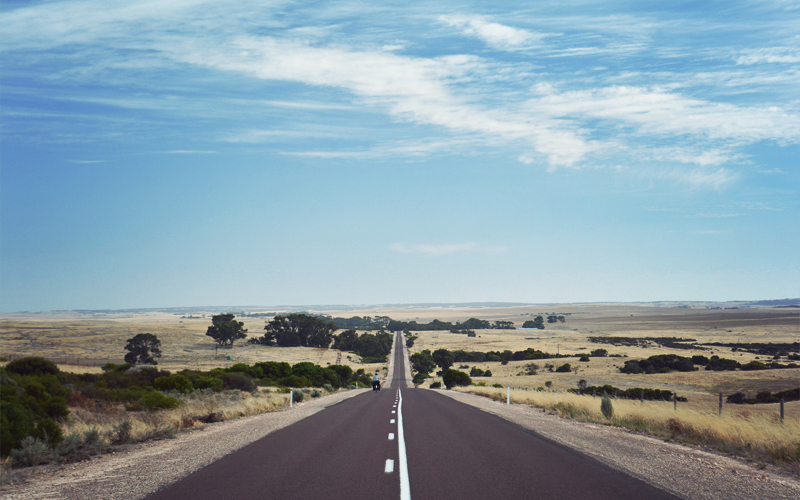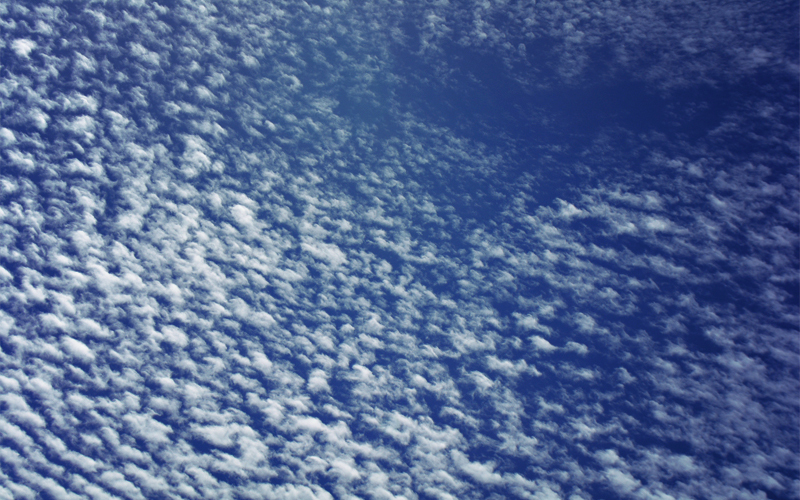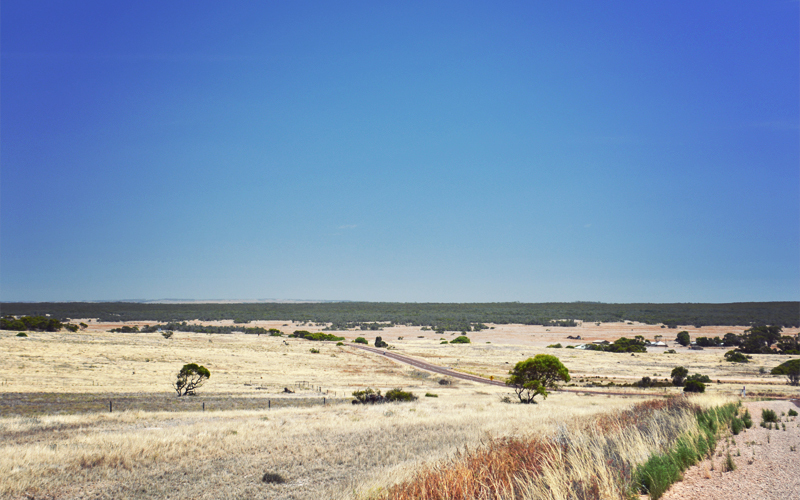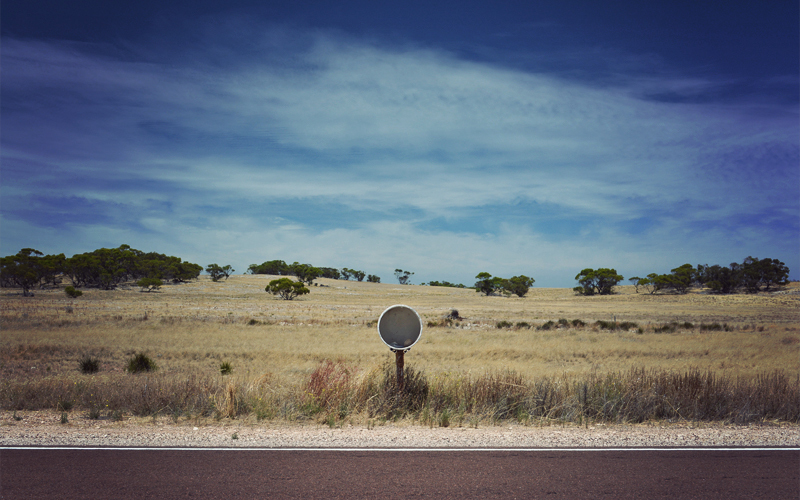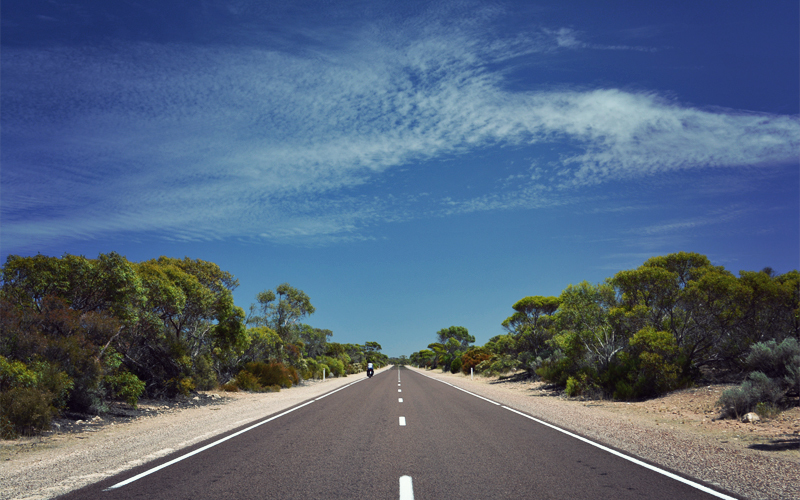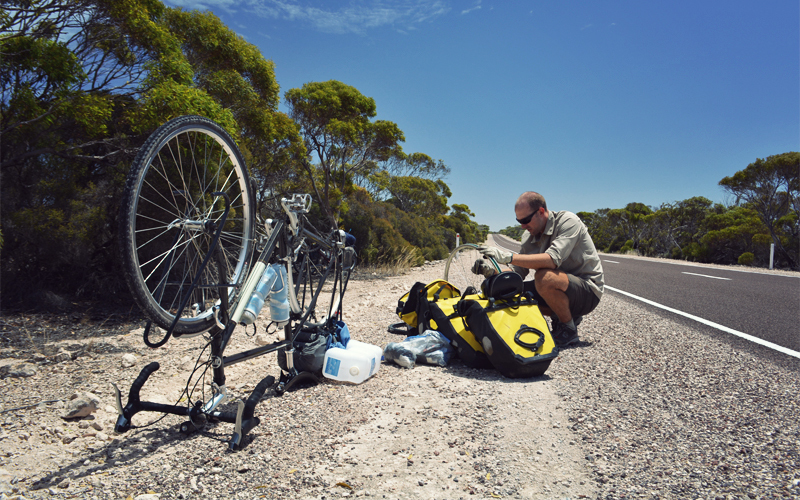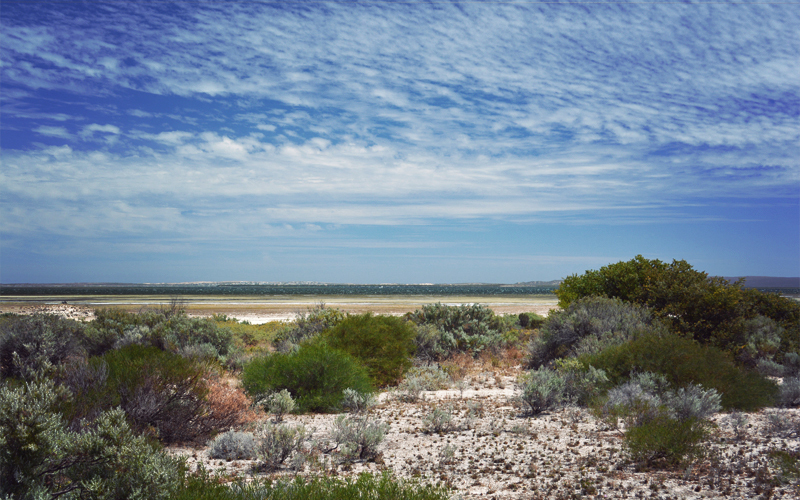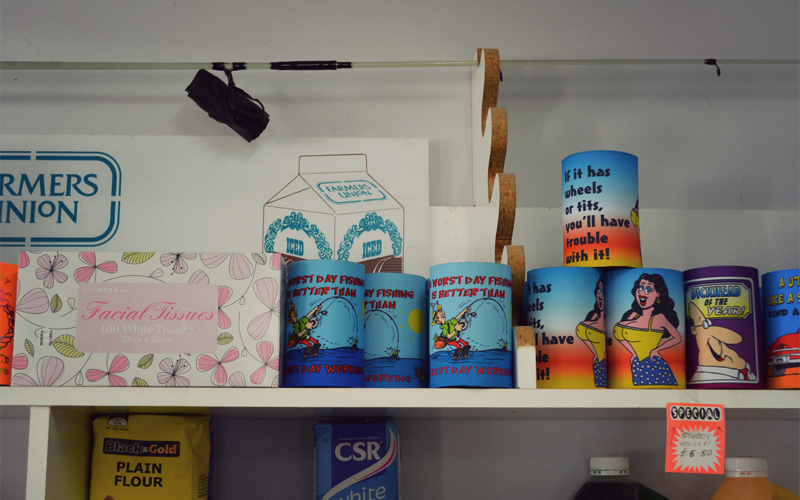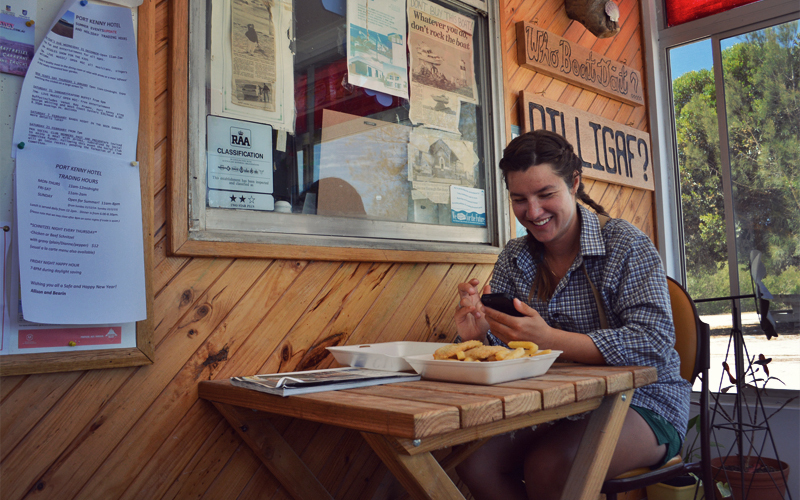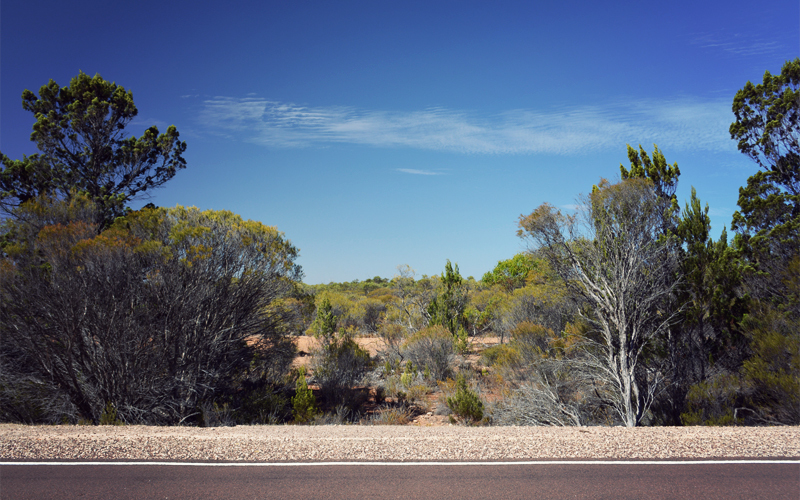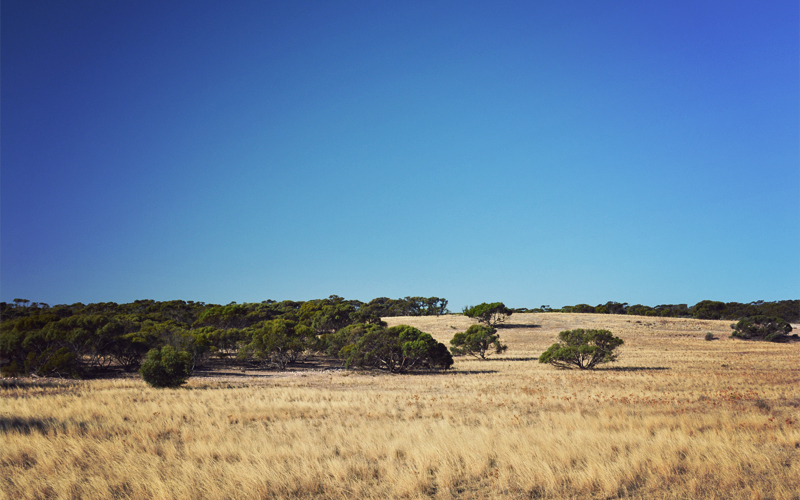January 31, 2015
Day 158: Elliston, SA to near Streaky Bay, SA
It's with a lot of relief and also a lot of wonderful memories that we roll through the streets of Elliston one last time on our way out of town. We head along the foreshore, past the police station and pharmacy, then turn in front of the grocery store and bakery and pub that together form the modest center of town. After a quick stop for Tim Tams and bananas we return to the highway and pedal past the school where we presented to the kids back on Wednesday. Only a few minutes later we cross the invisible line that marks the northern edge of a town that we've come to know and appreciate, but that we're almost certain to never see again.

| Heart | 1 | Comment | 0 | Link |
For the first time in more than a week we ride with a sustained tailwind giving us a push. As soon as the sea fades from view we're back among the same kind of landscape that guided us across the peninsula: rolling hills covered in yellow grass and fat chunks of rock, little lakes at the bottom of the valleys with a ring of deep green around them, and rusted old windmills spinning on the breeze and helping pull up semi-salty water from far below to keep the flocks of sheep alive. We only know we're near the sea at all when we reach the top of a rise and see the golden glow of sand dunes looking back at us well to the west.
The road trains are asleep on this Saturday morning, tucked in some distant dusty lot far from the highway, and I picture the utes standing idle next to the back doors of far-off farmhouses with herding dogs laying in the shade cast down by the bed and watching the world move slowly past. We ride for miles at a time without seeing any of these farmhouses, and when they appear again they're always set far enough back from the road that all we can see of their features are rough outlines. The highway meets what we've decided is the first and most important requirement of any rural road: there's so little around that you can take a leak wherever you want, without having to worry about a passing driver or a nearby homeowner watching you whip it out along the edge of the shoulder.
The dull yellows of the hills and the ruddy gray of the pavement become afterthoughts in an instant when we find ourselves riding into a long stretch of native bush on state conservation land. That's where the explosion of green that extends in all directions as far as the eye can see takes over, and where we can imagine what this part of Australia looked like before the wheat fields and sheep arrived. And that's what I'm looking out on when it happens.
We make it all of thirty-four miles of smooth highway before I hear an emphatic ping from the rear wheel. Despite the fact that the road is perfect, that I'm carrying less water than normal, and there's no extra food or other weight in my bags, the wheel that was repaired less than twenty-four hours ago has broken again. Of course it has.
This isn't just aggravating, but also problematic, because my understanding of how wheels are put together is shallow, and I've never in my life changed a busted spoke. But there's no other choice now; I have to figure it out to get us back on the road. And so goes the dance of taking off all the panniers, removing the back wheel, taking off the tire, and trying to make sense of what happens after that. Because the spoke sheared at the hub, that end of the thing sits somewhere on the highway behind us, which makes it easy to remove the rest of the spoke by unscrewing it from the nipple and then slamming it down into the ground in disgust. What's harder is trying to figure out how to get the replacement spoke through the vacant hole in the hub, because even though the hole sits on the non-drive side of the hub, the amount of space in between the hub and the cassette isn't wide enough to let the spoke slide into place. And although we picked up a cassette removal tool in Port Lincoln, we don't yet have the wrench needed to use it, because we thought we'd make it more than thirty-four miles down the road before needing to use it.
But then we notice small gaps in between certain cogs of the cassette. If we can slide the spoke through one of these gaps so that it fits straight into the hole in the hub, we might be able to get the spoke in the right spot after all.
It takes more than a dozen tries, but in time we find that gap and we find that right spot. That still leaves guesswork about how tight to wind the new spoke, and we have no idea what to do about the tension on the thirty-one others, but hey, we just replaced a spoke by the side of the highway that's going to let us keep going. Fucking sweet.
The lingering anger and frustration that we had to deal with a broken spoke in the first place push us the last six miles into Port Kenny in no time at all. There we find a roadhouse with a caravan park attached to the back of it and exactly nothing else. It's the kind of place that has as much in the way of fishing poles, lures, bait, floppy hats, beer coozies, outboard motor lubricants, and hip flasks with sayings like "I drink to make other people interesting" printed down the side as they do of food and water. I'm happy that at least I have the chance to order fish and chips, although when I look behind the counter I see that it's being made in a kitchen that looks like the one you'd find attached to the end of someone's house. On further inspection I realize this is because it is in fact a kitchen attached to the end of someone's house.
By the time we step out of the eating area that feels like an enclosed front porch, and which not that long ago might have been someone's enclosed front porch, the wind is howling at thirty to forty miles per hour. It leaves the water on the surface of the bay half blue-green and half white from the thousands of waves that make their way toward the mud and the stink of the exposed tide flats.
With an unbroken tunnel of short gum trees and the heavy tailwind guiding us toward the northwest, we keep cranking hard. But it's tough to pay attention to the detail of what's around me, because I can't believe we're still dealing with the same kind of mechanical problems that left us stranded for the last four days. I'm upset with myself for ending up with the wheel coming apart in the first place, knowing that I should have just ordered a replacement long ago and picked it up when we rolled into Adelaide. But the stronger and more visceral source of frustration comes from thinking about the bike mechanics who said they'd help, who acted as if they were helping, but who have so far failed to help with much of anything, and have us heading toward the Eyre Highway and the Nullarbor Plain with a worse than average chance that my bike will make it to the other side.
One dead sheep and many more dead kangaroos stand in decay at the highway's edge, and little red foxes sniff at them and run off into the bush the moment they see us headed their way. In between we get thumbs ups and waves and honks of support from almost every vehicle that passes headed the other way. All of this happens among wind so strong that when we stop to eat I have to weigh down the windward edge of my tortilla so that it doesn't blow away while I'm layering the inside with peanut butter and jam. In the end I'm not quick enough, and a big gust of wind kicks up a cloud of dirt that sticks in a fine layer all over my dinner.
I have Kristen ring the bell on her handlebars when we hit the sixty-eight-mile mark, because it means that I managed to replace the spoke in my rear wheel having never done it before, and yet it still lasted longer than the job done by the guy in the bike shop back in Port Lincoln. Beyond the celebration, and aside from the time I spit into the wind by mistake and it blows back onto me in a little wet cloud, it's mostly just pedaling. We push hard and take few breaks, passing between wheat fields and gum trees and back again for hours. We watch our shadows grow longer and longer, but the winds fade only in small increments and give no indication that they'll say goodbye any time soon.
In the late evening I hear a click-click-click coming from somewhere below and behind me. I stop the bike right away and check the wheel, all of the spokes, and the brakes, but find nothing.
And so I hop back on.
I ride literally ten feet farther before I hear and feel a powerful bang, followed by the hiss of all the air in the rear tube flowing out into the atmosphere in half a second.
It's the kind of sudden explosion that can only mean one thing: the narrow band of rubber that covers the tire's metal bead has been shredded by one of the many people who have screwed with the rear wheel in the past month, and that bead just pinched the tube and gashed a wide hole in its side. And to make things even more frustrating, I have an Ace of Base song impossibly stuck in my head. It's a bad situation all around.
I wheel the bike a few hundred feet back the way we came, push it up a side road we just passed, and then we walk off into the bush. While Kristen sets up the tent, I go through the dance of unloading the bike, flipping it over, and removing the back tire from the rim. There's a wide hole near the valve, so I throw a few patches on it with as much speed as I can, remount the tire, pump it back up, and all but fall exhausted onto the dirt-stained sleeping bag in the tent. The day has taken everything out of me.
The long series of mechanical issues that have followed me since we arrived in Australia continue, and it's reached the point where I can't go more than five or six miles during the day without thinking about some existing problem or a problem that might conceivably reveal itself soon. We reach Ceduna tomorrow. It marks the start of the most demanding stretch of riding I will have ever attempted. And even if the new wheel arrives as promised, I'll be heading out there with less confidence in my bike than I've ever before experienced. It's a terrible place to be.
Today's ride: 77 miles (124 km)
Total: 5,198 miles (8,365 km)
| Rate this entry's writing | Heart | 2 |
| Comment on this entry | Comment | 0 |
